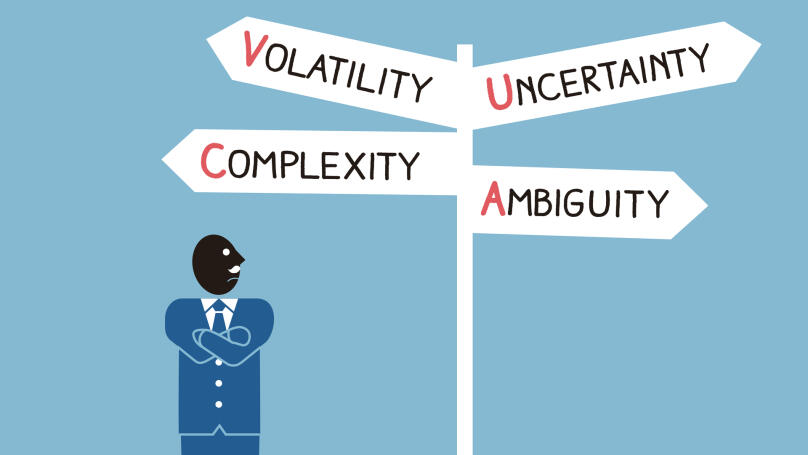VUCA

In today's world, the word VUCA has become a fashionable acronym used in speech and articles, but it is not fully understood. We will explain everything you need to know about the term.
What is VUCA?
VUCA is an acronym of four component words or challenges describing the modern world. The term VUCA has come into our everyday life from a military lexicon: it appeared after the 9/11 terrorist attack on the Twin Towers in the United States. It got used by the US Army to denote a rapidly changing and unpredictable situation which cannot be planned or foreseen.
VUCA stands for the following:
- Volatile - changes in the world are continuous and always large-scale, affecting all areas at once;
- Uncertain - the present is difficult to describe, and the future cannot be determined;
- Complex - many interdependent factors are so messy that they lead to chaos;
- Ambiguous because no situation can be fully understood, so there is always some unclearness.
Today, VUCA's meaning is much broader. It represents an entire concept which underpins modern management and career strategies. The term VUCA was adapted to the business world by Bob Johansen in 2009 in his book Leaders Make the Future. With this definition, he referred to the turbulence of today's world, which we can see every year in both the economic and social spheres and constantly changing skill sets and mindsets required of professionals.
What is the VUCA world?

When it comes to what VUCA means in practice, you're likely to spot signs of it just by looking around. For instance, this is what the day looks like for the average person living in the VUCA world today:
- Work - global tasks alternate with local ones, and competencies circulate from profession to profession and mix. So you have to be cross-functional and be able to prioritise, delegate, and constantly learn new things;
- Family - work has to be combined with taking care of children and loved ones, and even at home, it is impossible to complete all tasks without delegating some of them;
- Friends - everyone tries to talk about themselves and their business first; meetings have become rare due to a lack of time and internal resources, and the circle of contacts may change frequently or disappear altogether;
- Social media - we are in an incessant flow of information. We constantly consume news (even during working hours), evaluate and analyse it;
- News - every day, there are important events, usually negative ones.
The VUCA world is an era where people have no certainty about tomorrow and no clear plans for the future because of the volatility of that future and its values. The COVID-19 pandemic, which paralysed the world in 2020, shows the precarious situation in all spheres of a social life again, from health to economy and culture.
Disadvantages and advantages of VUCA

Many experts argue that the components of VUCA, such as volatility, uncertainty, complexity, and ambiguity, will only get worse over time and extend from the business sphere to all other spheres of life. Consequently, one needs to understand what this threatens precisely. VUCA can:
- Destabilise society psychologically, causing anxiety and health problems for employees and, at the same time, emotional burnout;
- Demotivate and inhibit successful career development;
- Make you need to learn again, to change your competencies and skills;
- Make you devote more energy and resources to your work;
- Put long-term projects at risk;
- Compel to change the corporate culture and influence the company's internal environment;
- Make you reconsider your approaches and strategies, reduce the effectiveness of current practices, and thereby undermine your efforts.
All of the above, however, does not mean that the challenges VUCA will necessarily cause the individual and the business to suffer a setback sooner or later. In fact, thanks to VUCA, one can also:
- Improve their leadership and management skills, learn how to work in a team and coordinate its members;
- Start to make decisions and become a team leader by considering the ambiguity of the situation as a subject for further exploration and launching exciting initiatives;
- Implement business innovations and new frameworks, such as artificial intelligence, to automate part of the business processes, reduce the load on the team and stabilise the situation;
- Create new partnerships and business contacts. In the era of VUCA, it is more important than ever to cooperate with other organisations;
- Bring the team together morally, as overcoming challenges together builds spirit and personal relationships between the members;
- Refresh your workforce, as in the VUCA world, new cross-functional and adaptable professionals are emerging who can take your business to the next level.
What is VUCA leadership?

Leadership within the VUCA model is the ability to change quickly and respond to changes in the environment by taking clear, effective and flexible actions to capitalise on these changes and mitigate their impact on the business or the team. Thus, the manager's role in the VUCA environment is essentially creating at least minimal certainty in times of uncertainty. The greater the complexity and unpredictability of a situation, the more leadership the leader must exhibit, and the more involvement is required. However, there is no instruction on how a leader should act in a VUCA environment. The leader's main task is to adapt and find a solution in a minimum amount of time.
However, you also need conventional leadership skills to help in this. Above all, VUCA leadership skills include:
- The Vision. This is the ability to see the big picture, set a clear goal for the team, and intelligently fit their actions and projects into the current situation. In a fast-changing and unpredictable environment, the vision of the goal can save the business from collapse. Otherwise, it is impossible to intelligently rebuild and adapt the original plan without getting bogged down in chaos.
- Tracking and analytics. Monitoring trends, analysing the market and keeping an eye on competitors can save a company from collapse in the event of an unforeseen crisis by making it part of its daily routine. A leader can notice early warning signs of change or adopt competitors' solutions in time to save the situation.
- Flexibility and adaptability. The ability to step outside the box, break stereotypes and adapt to demands outside the original plan separates a true leader from an ordinary employee.
- Decision-making. Decisions are made more difficult in a turbulent environment. It is challenging to assume responsibility morally. That is especially true and more difficult if resources are limited. However, leadership in a VUCA world implies the ability to act even when you are not fully informed and can't rely on previous experience.
- Teamwork. In VUCA times, no business practices are 100% guaranteed to be the best and work everywhere and anytime. That's why collaborating with your employees and management is the only way to get everyone involved in the processes to find new and innovative solutions.
Also, in a VUCA environment, the leader may face the additional task of introducing change to employees, which they may instinctively start to resist. Some may continue to try the old ways in the new environment and refuse to follow the principles of the VUCA rules, which will inevitably put the business at risk. There can also be a problem of paralysis due to fear, which in turn can cause apathy and inaction. All of this the leader must also be able to solve by having short but intense meetings with their team and teaching (not coercing!) them to survive in a VUCA environment.
The VUCA model in strategic management

While the VUCA concept can sound downbeat and depressing, as if it sets businesses up for failure and bankruptcy, it also holds many opportunities for those seeking them. You can harness the complexities of the VUCA world to your advantage by adopting strategic management based on it.
The keys to effective management in VUCA environments are:
- Countering volatility. Develop a guide with a strong and convincing plan with clear and universal KPIs or criteria that you can use in all situations. Also, training employees and developing the leadership skills we wrote about above will help reduce volatility and risk. Regular training, in and of itself, develops flexibility and adaptability skills, in addition to enabling employees to keep abreast of trends and keep their knowledge up-to-date.
- Investment prioritisation and analytics. In the VUCA world, it pays to invest primarily in the development department so that the company can launch new products according to rapidly changing consumer demands. However, it would be best if you also determined in advance where you can cut the budget in emergency cases and how to optimise costs. At the same time, it is important to listen to customers' wishes - surveys or A/B-testing are good ways to identify them.
- Evaluation of the work done. Review each resolved issue and crisis your company has tackled to improve the effectiveness of your efforts in the future.
- Simulations and experiments. Together with a coach or independently, a business can explore different market scenarios to learn how to react to them quickly and rationally. Also, an experimental approach in advertising or products can increase a company's adaptability to change. Script and crisis planning, team- and role-playing are also tools to pump up the vision in the VUCA world.
- Abandoning micromanagement in favour of VUCA management. The more autonomous the company's employees, the more likely it is to withstand all situations. The leader should only guide and coordinate the team, establish communication and encourage cooperation.
- Promotion of VUCA professionals. Promote employees who demonstrate VUCA skills such as high adaptability and creative thinking professionally and career-wise.
- Cultivating ideas. Allow employees to take the initiative, encourage debate and the generation of fresh ideas, listen to others' opinions and develop a vibrant corporate culture.
VUCA real-life examples
You can find most examples of VUCA during the COVID-19 period we mentioned earlier. Due to the lockdowns and the economic crisis that the rapid spread of the virus entailed, all areas of human life were forced to adapt as quickly as possible. For example, the schools' transfer to remote learning via digital technology is nothing short of a solution from the VUCA world. Remote working for employees, merging libraries and research centres under the umbrella of major universities, and media cooperation with the WHO (World Health Organisation) and the authorities are all worthy instances of VUCA.
In "quieter times," one can also find many examples generated by the penetration of technology into everyday life, which triggered changes in consumer demands. For instance, Uber revolutionised the taxi industry by being one of the first to change its car-booking system, offering different car classes and customisable settings. Airbnb carried out a similar upgrade, only in the hotel sector. Elon Musk's self-driving cars are also an example of VUCA, as they are an adaptive solution for the inhabitants of megacities.
The emergence of Agile team management technique, 5G internet, energy-saving batteries and wireless charging is also part of VUCA. Thus, all of today's scientific progress results from the instability that prevails in the world and changes the needs of ordinary people.























